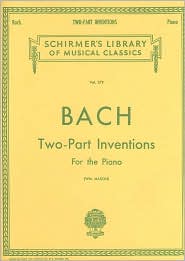Born March 21, 1685
My older sisters all took piano lessons, the first two only briefly, the third for some years. This third sister (who is 7 years older than I) stuck with it long enough to learn a little Bach. My first memory of this music is a Schirmer edition of something -- the inventions, perhaps? -- with the old buff-colored cover and the mysterious (to me, as a child) appellation, "Bach," front and center. Despite my sister's halting attempts at it, the music struck me as comfortingly organized, cheerful, substantive. Even my untutored ear responded to its many levels, from finger exercise to harmonious, architectural whole.
When I started lessons myself, I spent a few years on utter dreck (cheesy arrangements of pop tunes, etc.), but at some point my teacher decided I was ready for the good stuff, so she told me to get the book "Eighteen Little Preludes and Fugues" put together by Busoni. I wish I could say that I instinctively knew what to do with this and developed incredible skill and sensitivity in my playing, but alas, I did not. I knew there was something important there, but I did not know how to get at it.
Early in my cello-playing career, I discovered that Bach had written six solo suites for cello, and of course I wanted to play them. I began my explorations into them at age 14; one could not really "finish" such a thing, though I delved into it fairly thoroughly. I suppose the official culmination was my doctoral thesis on the fifth and sixth suites and the lecture recital I gave on the same topic.
Though they comprise great music in their own right, the solo cello suites are not at the same level as the keyboard works or even Bach's solo violin music. They could even be described as primitive -- just six preludes exploring various techniques and six simple sets of dances. This was probably intentional on Bach's part because the cello was relatively unexplored territory at the time, and it was not his instrument. The cello suites progress in difficulty, so I believe they were meant as pedagogy. There is implied counterpoint and some multivoice writing, but basically they are fiddle tunes. Even so, any other solo cello music pales in comparison, and time spent on playing them is rewarding in many ways.
But the keyboard music is infinitely more so. There is so much to play there, and again, on so many levels, that they can be enjoyed anywhere on the spectrum from occasional hobby playing to full-time, lifetime endeavor. I am somewhere in between. When I'm being realistic, I know that I will never play as many of them as I would like. On the other hand, the music exists and will be there for me whenever and however I choose to take it up. As it is for anyone.



2 comments:
I am happy to have just discovered your blog. Within the past 2 years I have returned to the cello after decades away and am also getting into the ups and downs of preparation and lessons. I have been avoiding the Bach suites so far because they are so familiar to people, particularly the first, and I won't ever be able to play them particularly well.
I will never play the Swan because when I was young I heard Victor Borge do a comedy riff on someone's young daughter playing it for company and it was hysterical, yet familiar.
I could write a whole blog post on The Swan. Maybe a book. :)
I think one needs to somehow put past familiarity with particular pieces out of one's mind to be able to learn them well. I like to imagine that I am the first person who has played the piece and that I am trying to understand what the composer had in mind when he (or she -- though I've played very few pieces by women, sad to say) wrote it. The pieces most familiar to people are popular for a reason -- they are good!
The Bach suites are very good learning tools for cellists, so please don't be afraid to use them. You won't cause any permanent damage!
Post a Comment